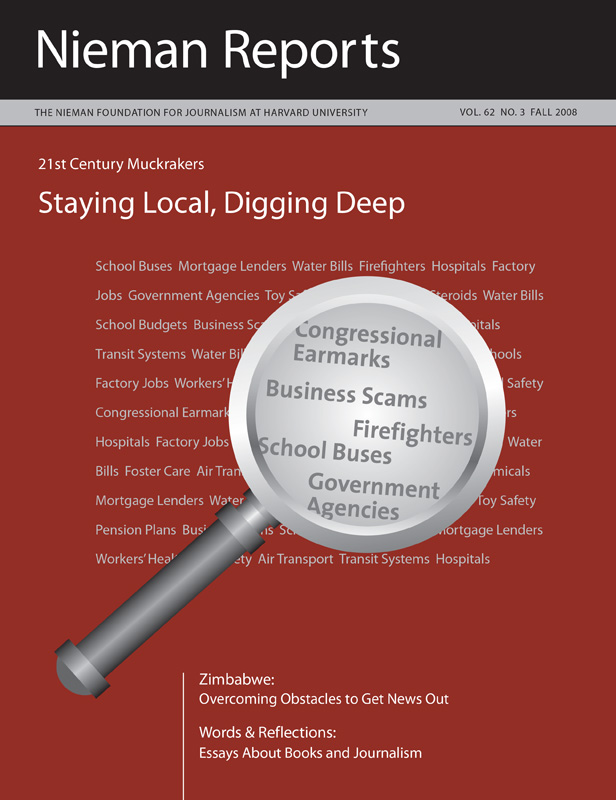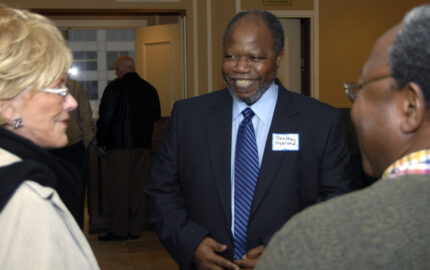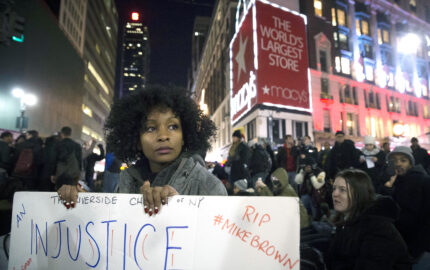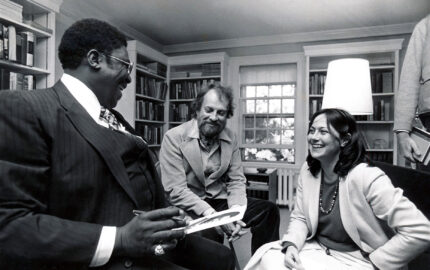Since 2001, Karl Idsvoog, a 1983 Nieman Fellow and professor of journalism at Kent State, has trained student and professional journalists in the Republic of Georgia. He developed the broadcast portion of the masters program at the Caucasus School of Journalism and Media Management and returns there often to teach.
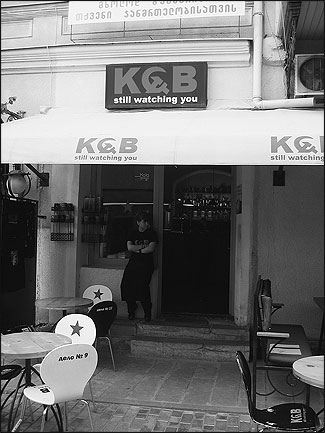
A restaurant in Tbilisi, Georgia. Photo by Karl Idsvoog.
The free press has been taking a real beating in the Republic of Georgia. Last November, amidst political protests, Georgian special forces stormed Imedi Television. One of my former students working there as a videographer came down to greet them with a video camera and quickly found his camera confiscated, and he was ordered at gunpoint to stay on the floor and not move. Television station Rustavi 2 used to be the hard-hitting investigative station. Since the Rose Revolution, it’s become the voice of the government; more than one of my students who works or has worked there tells me that stories critical of the government, quite simply, have been off limits.
Bad things happen when journalism fails. In the United States, we saw the high price paid when journalists failed to aggressively question the administration as it marched to war. In Georgia, a high price is being paid for the government taking steps to all but eliminate the ability of an independent press to function in what was claimed by its leaders to be a democracy. How different might the situation be today if Georgian journalists had been able to do a better job of questioning the Saakashvili government? Government leaders may wage war, but it’s the people of the country who must live with its consequences. —Karl Idsvoog
What follows is e-mail correspondence that Idsvoog has received from former students and friends in Georgia who are journalists as they have covered and observed what has happened to their country, its people, and their own ability to report on these events during this war with Russia. Punctuation and grammar have been left in their original form.
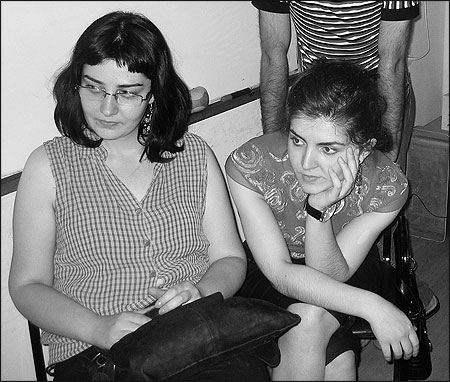
Rusudan Panozishvili, left, and Tsira Gvasalia, students at the Caucasus School of Journalism and Media Management, Tbilisi. Photo by Karl Idsvoog.
Rusudan Panozishvili, student, Caucasus School of Journalism and Media Management, Tbilisi.
August 10, 12:54 p.m.
Thank you Karl. I am OK. Who knows what will be? I could never imagine I would hear bombing in Tbilisi. And why? Who cares this South Ossetia if everyone would die? We have info. that very many, about 2-3 thousand Georgians are dead. And the hospitals are filled. And the government today announces that there are 92 dead! Everyone is laughing at our people, not only Russia. And here also everyone is disappointed in the only formal dislikes of the international community about Russia’s steps. We are alone here and our friends, boys, journalists are dead. As we know Russians are already at Gori, Tskhinvali is lost. It is not the official info., but our boys, relations, who were in Gori say that. As you would know, Russia is also bombing the peaceful towns all over Georgia. I have an impression that US and Europe and people in the world do not have the right information, what’s happening here.
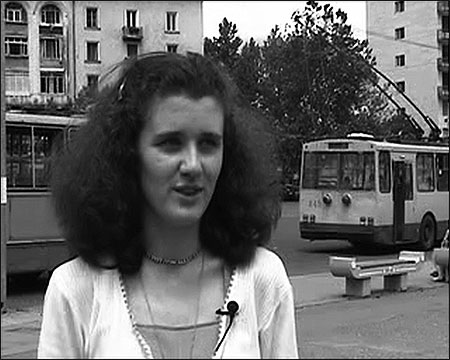
Kristina Tashkevich, reporter. Photo by Karl Idsvoog.
Kristina Tashkevich, reporter, Georgian newspaper The Messenger, 2002 graduate of the Caucasus School of Journalism and Media Management.
August 10, 4:23 p.m.
Hi,
The situation is insane. A territory near the airport was bombed. We don’t know what happens tomorrow. Life has just changed into a nightmare. My friends—both journalists—were killed in Ossetia. Just confirmed that..am devastated..
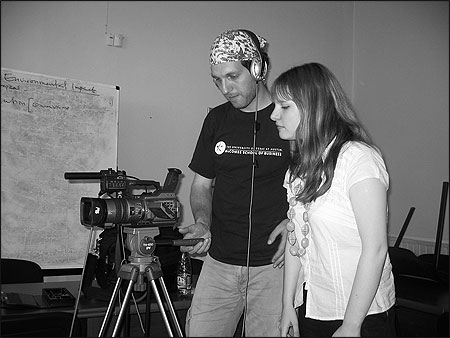
Eka Chitanava, right, and Temo Bardzimashvili, masters students at the Caucasus School of Journalism and Media Management, Tbilisi. Photo by Karl Idsvoog.
Eka Chitanava, masters student at the Caucasus School of Journalism and Media Management.
August 11, 4:19 a.m.
Hello Karl!
Can u see what is happening? The war is raging in Georgia, Tbilisi also has been bombed last night. Two bombes struck near my residence, the sound of explosion was so great that windows were rattling at my home. People are in panic, refugees from various cities, and especially from Gori and Tskhinvali, are coming every day and every hour. But you know what is the most horrible, that we’re in an information vacuum. Our government until the very nick of time was saying that Georgian troops controlled the territory of Tskhinvali. But it turned out that we lost this region. Gori and Tskhinvali are loaded with corpses of Georgian soldiers. But our media sources are reporting that death toll comprises just up to 100 people. European media sources are reporting about 2000. It’s deceit! People are flocking to hospitals and searching for their lost relatives, friends, some of them just disappeared, some of them are dead, and most are seriously injured.
By the way, according to Georgian TV channels foreign journalists and one Georgian journalist are dead. And what is the most concerning, how reacts international community, the U.S., all the time Bush is calling for ceasefire, but there is no end to hostilities.
Eka Chitanava
August 11, 6:02 a.m.
We couldn’t enter Gori yesterday. 5 minutes earlier Georgian TV channel Imedi and Canadian journalists were robbed of their cars and equipment. It is very hazardous for women to go there. One woman was crying about her daughter who was raped in front of her by Ossetian and Kazak rebels. Policemen warned me not to go there because of high risk. I was with Danish journalists, helping them with translation.
So it’s really difficult for journalists to penetrate across the border. Rebels are looting those people who stay in Gori and spend nights in basements.
I hope when Georgian policemen take control in Gori we will be able to cover the situation there, otherwise it’s very dangerous.
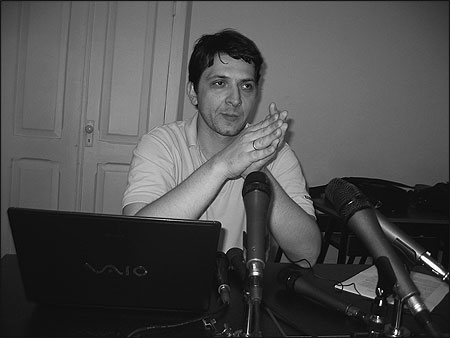
Valeri Odikadze at a news conference. Photo by Karl Idsvoog.
Valeri Odikadze, former videographer/producer/editor of Rustavi 2 Television, now journalism trainer, Caucasus School of Journalism and Media Management and owner and president, Videoscope, which supplies professional video equipment/systems.
August 14, 3:01 a.m.
Russians went to a middle Georgia, terrorize resident people. Actually no russian make terror but north caucasus/ossetia/cozacks bandits take things from houses, take young people, young girls.
It is like 16th century.
.jpg)
Keti Beraia, reporter. Photo by Karl Idsvoog.
Keti Beraia, reporter, Georgia Public Television, graduate Caucasus School of Journalism and Media Management, 2002.
August 15, 5:36 a.m.
I’m back from Poti. It’s truth that our coastguard boats were blown up. I was covering conflict from the very beginning. I filmed how the Russian troops went to Senaki, to Poti.
We were the only TV company covering Russian troops in western Georgia. Others run away. I filmed what was left after bombing in Senaki. We saw hands, ears and other parts of people after bombing. I saw dead soldiers—that was horrible. But I kept going without panic.
Yesterday our journalist was injured, while she had a liveshot.
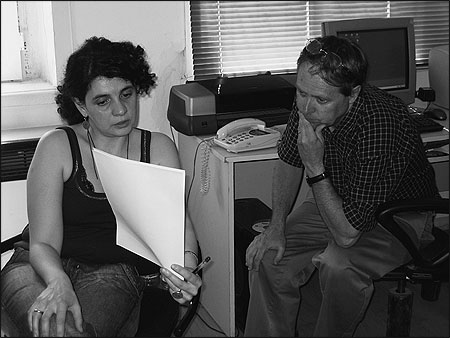
Tiko Tsomaia, left, an instructor at the Caucasus School of Journalism and Media Management, with past academic director David Bloss. Tbilisi. Photo by Karl Idsvoog.
Tiko Tsomaia, Instructor, Caucasus School of Journalism and Media Management.
August 16
Dear Karl,
Thank you, I and my family are safe.
Situation is horrible. It is still tense, but I hope very much for better resolution. I hope for peace.
Right now our forests are on fire and Russians don’t allow Georgian and Turkish firefighters to bring a fire under control. You can judge about the rest yourself.
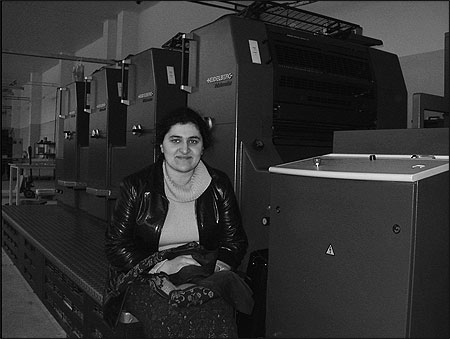
Shorena Shaverdashvili by one of her printing company’s Heidelberg presses, Tbilisi, Georgia. Photo by Karl Idsvoog.
Shorena Shaverdashvili, manager of a printing company, Tbilisi.
August 19, 2008
Dear Karl,
Good to hear from you!
Me and my family are safe and sound. We came back to Tbilisi 2 days ago. There is so much going on that I am having a hard time finding words for what we are going through.
I am hoping this nightmare ends soon, this occupation ends soon, and this crisis does not escalate further, involving american or european military activities here in Georgia. I don’t even want to think of what will happen if Georgia becomes the battleground for any kind of international confrontation. This is probably less likely, but it’s a consideration.
I do not feel very hopeful, though. I expect that Russia will stay here for a long time to come. They have a lot to gain by their presence here and not much to lose—in spite of the european dependency on Russian energy and despite the international pressure on Russia. They are completely paralyzing the country and the time is on their side.
On the other hand, I cannot imagine my life here in the presence of the Russian occupation and dominance. If the international community falls short of stopping Russia and forcing them to withdraw their forces, and we don’t behave like Chechens, fighting until all our men are dead, then Russians will stay here for good, in which case I, and many other people, don’t see our future here.
I wish Russia had shed its imperialistic complexes and grown out of the Cold War era paradigms, and was thinking and acting adequately to the times, or to the goals of any modern nation. I wish we as Georgians had means to stop this war and invasion from happening.
We are also having a hard time maintaining our sanity and figuring out what we can be doing, or should be doing. Functioning on a daily basis is an effort when the country is fully paralyzed, despite our President’s hypnotizing and reassuring speeches. Though I realize this is no time to “prosecute” our government—now we just have to help them stop this conflict.
Before this war, we were planning to start a weekly political magazine, with an internet portal. I was in the middle of starting fundraising for it. If this country is to continue its existence, it desperately needs a news source, not propaganda machines in the form of televisions or incompetent daily newspapers with very little influence on the public discourse.
There has been a total information blackout. We receive our information mostly through international media. What we require is the local strong, independent media outlet, a watchdog, which grounds and analyzes news in a nonpartisan way and puts it in a wider prospective, so that we, as a nation, can start thinking critically again, come back to life again, act again, and find our voice again beyond what our government has to say in a constant monologue.
Any ideas on where to look for funding? In case of peace, this will be our N1 priority.
Thank you for your concern, Karl.
Shorena

A restaurant in Tbilisi, Georgia. Photo by Karl Idsvoog.
The free press has been taking a real beating in the Republic of Georgia. Last November, amidst political protests, Georgian special forces stormed Imedi Television. One of my former students working there as a videographer came down to greet them with a video camera and quickly found his camera confiscated, and he was ordered at gunpoint to stay on the floor and not move. Television station Rustavi 2 used to be the hard-hitting investigative station. Since the Rose Revolution, it’s become the voice of the government; more than one of my students who works or has worked there tells me that stories critical of the government, quite simply, have been off limits.
Bad things happen when journalism fails. In the United States, we saw the high price paid when journalists failed to aggressively question the administration as it marched to war. In Georgia, a high price is being paid for the government taking steps to all but eliminate the ability of an independent press to function in what was claimed by its leaders to be a democracy. How different might the situation be today if Georgian journalists had been able to do a better job of questioning the Saakashvili government? Government leaders may wage war, but it’s the people of the country who must live with its consequences. —Karl Idsvoog
What follows is e-mail correspondence that Idsvoog has received from former students and friends in Georgia who are journalists as they have covered and observed what has happened to their country, its people, and their own ability to report on these events during this war with Russia. Punctuation and grammar have been left in their original form.

Rusudan Panozishvili, left, and Tsira Gvasalia, students at the Caucasus School of Journalism and Media Management, Tbilisi. Photo by Karl Idsvoog.
Rusudan Panozishvili, student, Caucasus School of Journalism and Media Management, Tbilisi.
August 10, 12:54 p.m.
Thank you Karl. I am OK. Who knows what will be? I could never imagine I would hear bombing in Tbilisi. And why? Who cares this South Ossetia if everyone would die? We have info. that very many, about 2-3 thousand Georgians are dead. And the hospitals are filled. And the government today announces that there are 92 dead! Everyone is laughing at our people, not only Russia. And here also everyone is disappointed in the only formal dislikes of the international community about Russia’s steps. We are alone here and our friends, boys, journalists are dead. As we know Russians are already at Gori, Tskhinvali is lost. It is not the official info., but our boys, relations, who were in Gori say that. As you would know, Russia is also bombing the peaceful towns all over Georgia. I have an impression that US and Europe and people in the world do not have the right information, what’s happening here.

Kristina Tashkevich, reporter. Photo by Karl Idsvoog.
Kristina Tashkevich, reporter, Georgian newspaper The Messenger, 2002 graduate of the Caucasus School of Journalism and Media Management.
August 10, 4:23 p.m.
Hi,
The situation is insane. A territory near the airport was bombed. We don’t know what happens tomorrow. Life has just changed into a nightmare. My friends—both journalists—were killed in Ossetia. Just confirmed that..am devastated..

Eka Chitanava, right, and Temo Bardzimashvili, masters students at the Caucasus School of Journalism and Media Management, Tbilisi. Photo by Karl Idsvoog.
Eka Chitanava, masters student at the Caucasus School of Journalism and Media Management.
August 11, 4:19 a.m.
Hello Karl!
Can u see what is happening? The war is raging in Georgia, Tbilisi also has been bombed last night. Two bombes struck near my residence, the sound of explosion was so great that windows were rattling at my home. People are in panic, refugees from various cities, and especially from Gori and Tskhinvali, are coming every day and every hour. But you know what is the most horrible, that we’re in an information vacuum. Our government until the very nick of time was saying that Georgian troops controlled the territory of Tskhinvali. But it turned out that we lost this region. Gori and Tskhinvali are loaded with corpses of Georgian soldiers. But our media sources are reporting that death toll comprises just up to 100 people. European media sources are reporting about 2000. It’s deceit! People are flocking to hospitals and searching for their lost relatives, friends, some of them just disappeared, some of them are dead, and most are seriously injured.
By the way, according to Georgian TV channels foreign journalists and one Georgian journalist are dead. And what is the most concerning, how reacts international community, the U.S., all the time Bush is calling for ceasefire, but there is no end to hostilities.
Eka Chitanava
August 11, 6:02 a.m.
We couldn’t enter Gori yesterday. 5 minutes earlier Georgian TV channel Imedi and Canadian journalists were robbed of their cars and equipment. It is very hazardous for women to go there. One woman was crying about her daughter who was raped in front of her by Ossetian and Kazak rebels. Policemen warned me not to go there because of high risk. I was with Danish journalists, helping them with translation.
So it’s really difficult for journalists to penetrate across the border. Rebels are looting those people who stay in Gori and spend nights in basements.
I hope when Georgian policemen take control in Gori we will be able to cover the situation there, otherwise it’s very dangerous.

Valeri Odikadze at a news conference. Photo by Karl Idsvoog.
Valeri Odikadze, former videographer/producer/editor of Rustavi 2 Television, now journalism trainer, Caucasus School of Journalism and Media Management and owner and president, Videoscope, which supplies professional video equipment/systems.
August 14, 3:01 a.m.
Russians went to a middle Georgia, terrorize resident people. Actually no russian make terror but north caucasus/ossetia/cozacks bandits take things from houses, take young people, young girls.
It is like 16th century.
.jpg)
Keti Beraia, reporter. Photo by Karl Idsvoog.
Keti Beraia, reporter, Georgia Public Television, graduate Caucasus School of Journalism and Media Management, 2002.
August 15, 5:36 a.m.
I’m back from Poti. It’s truth that our coastguard boats were blown up. I was covering conflict from the very beginning. I filmed how the Russian troops went to Senaki, to Poti.
We were the only TV company covering Russian troops in western Georgia. Others run away. I filmed what was left after bombing in Senaki. We saw hands, ears and other parts of people after bombing. I saw dead soldiers—that was horrible. But I kept going without panic.
Yesterday our journalist was injured, while she had a liveshot.

Tiko Tsomaia, left, an instructor at the Caucasus School of Journalism and Media Management, with past academic director David Bloss. Tbilisi. Photo by Karl Idsvoog.
Tiko Tsomaia, Instructor, Caucasus School of Journalism and Media Management.
August 16
Dear Karl,
Thank you, I and my family are safe.
Situation is horrible. It is still tense, but I hope very much for better resolution. I hope for peace.
Right now our forests are on fire and Russians don’t allow Georgian and Turkish firefighters to bring a fire under control. You can judge about the rest yourself.

Shorena Shaverdashvili by one of her printing company’s Heidelberg presses, Tbilisi, Georgia. Photo by Karl Idsvoog.
Shorena Shaverdashvili, manager of a printing company, Tbilisi.
August 19, 2008
Dear Karl,
Good to hear from you!
Me and my family are safe and sound. We came back to Tbilisi 2 days ago. There is so much going on that I am having a hard time finding words for what we are going through.
I am hoping this nightmare ends soon, this occupation ends soon, and this crisis does not escalate further, involving american or european military activities here in Georgia. I don’t even want to think of what will happen if Georgia becomes the battleground for any kind of international confrontation. This is probably less likely, but it’s a consideration.
I do not feel very hopeful, though. I expect that Russia will stay here for a long time to come. They have a lot to gain by their presence here and not much to lose—in spite of the european dependency on Russian energy and despite the international pressure on Russia. They are completely paralyzing the country and the time is on their side.
On the other hand, I cannot imagine my life here in the presence of the Russian occupation and dominance. If the international community falls short of stopping Russia and forcing them to withdraw their forces, and we don’t behave like Chechens, fighting until all our men are dead, then Russians will stay here for good, in which case I, and many other people, don’t see our future here.
I wish Russia had shed its imperialistic complexes and grown out of the Cold War era paradigms, and was thinking and acting adequately to the times, or to the goals of any modern nation. I wish we as Georgians had means to stop this war and invasion from happening.
We are also having a hard time maintaining our sanity and figuring out what we can be doing, or should be doing. Functioning on a daily basis is an effort when the country is fully paralyzed, despite our President’s hypnotizing and reassuring speeches. Though I realize this is no time to “prosecute” our government—now we just have to help them stop this conflict.
Before this war, we were planning to start a weekly political magazine, with an internet portal. I was in the middle of starting fundraising for it. If this country is to continue its existence, it desperately needs a news source, not propaganda machines in the form of televisions or incompetent daily newspapers with very little influence on the public discourse.
There has been a total information blackout. We receive our information mostly through international media. What we require is the local strong, independent media outlet, a watchdog, which grounds and analyzes news in a nonpartisan way and puts it in a wider prospective, so that we, as a nation, can start thinking critically again, come back to life again, act again, and find our voice again beyond what our government has to say in a constant monologue.
Any ideas on where to look for funding? In case of peace, this will be our N1 priority.
Thank you for your concern, Karl.
Shorena
